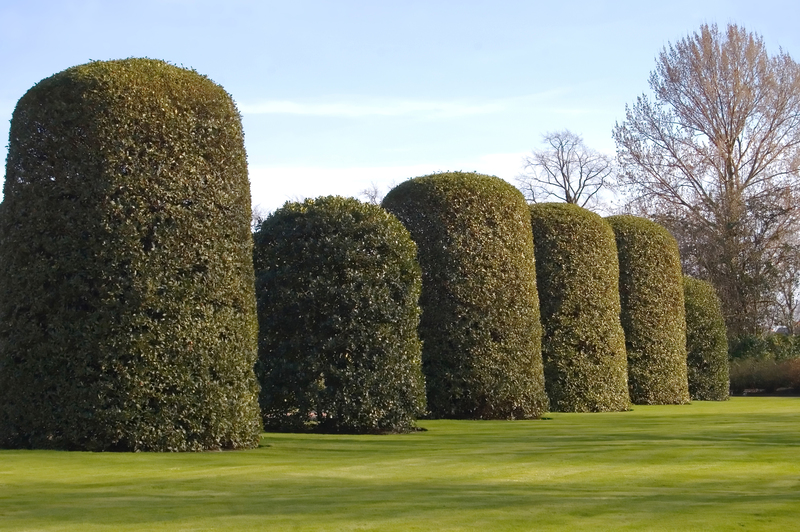Essential Lawn Care: Tips for New Gardeners
Posted on 16/10/2024
Taking care of a lawn can seem like a daunting task for new gardeners, but with the right knowledge and practices, you can transform your patch of grass into a lush, green space. Whether you're starting from scratch or taking over an existing lawn, these essential tips will help you maintain a healthy, thriving lawn year-round.
1. Soil Preparation: The Foundation of a Healthy Lawn
Before planting a lawn, it's crucial to understand your soil type and prepare it accordingly. Testing your soil's pH and nutrient levels can give you a clear understanding of what amendments it might need.
- Aeration: Compacted soil prevents water, air, and nutrients from reaching the grass roots. Aerate your lawn by making small holes in the soil to improve its health and encourage deeper root growth.
- Fertilization: Based on your soil test results, choose a fertilizer that balances nitrogen, phosphorus, and potassium levels. Organic fertilizers are excellent as they improve soil structure over time.
- Lime Application: If your soil is too acidic, adding lime can help to raise the pH and create a more hospitable environment for grass.

2. Selecting the Right Grass Type
Choosing the right grass type for your region and lawn conditions is vital for success.
- Cool-Season Grasses: These grasses, such as Kentucky bluegrass and fescue, thrive in cooler climates and have their peak growing periods during the spring and fall.
- Warm-Season Grasses: Varieties like Bermuda grass and Zoysia are ideal for warmer climates and grow best during the summer months.
- Shade-Tolerant Grasses: If your lawn has a lot of shade, consider grasses like fine fescue that are more tolerant of low light conditions.
3. Proper Mowing Techniques
Mowing might seem straightforward, but doing it correctly can make a significant difference in the health of your lawn.
- Mow Height: Different grasses have different optimal mowing heights. For cool-season grasses, keep the grass at about 2.5 to 3.5 inches. For warm-season grasses, 1 to 2 inches is preferable.
- Mow Frequency: Regular mowing encourages healthy, dense growth. During the peak growing season, mow your lawn once a week.
- Sharp Blades: Ensure your mower blades are sharp to make clean cuts. Dull blades tear the grass, making it more susceptible to disease and stress.
4. Watering Wisely
Watering is a critical aspect of lawn care, but overwatering or underwatering can both cause problems.
- Deep and Infrequent Watering: Water your lawn deeply and less frequently to encourage deeper root growth. Aim for about 1 inch of water per week, including rainfall.
- Early Morning Watering: Water your lawn in the early morning to minimize evaporation and reduce the risk of disease.
- Avoid Puddles: Ensure your lawn does not have areas where water pools, as this can lead to root rot and fungal diseases.
5. Weed and Pest Control
Keeping weeds and pests in check is essential for a healthy lawn.
- Pre-emergent Herbicides: Apply these in early spring to prevent weed seeds from germinating.
- Manual Weeding: Remove weeds by hand or with a weeder tool. For persistent weeds, spot treatments with a selective herbicide can be effective.
- Pest Management: Keep an eye out for common lawn pests such as grubs or chinch bugs. Beneficial nematodes and insecticidal soaps can be part of an organic pest control strategy.
6. Seasonal Lawn Care
Adjust your care routine with the changing seasons to maintain a vibrant lawn all year.
- Spring: Rake away winter debris, overseed bare spots, and apply a balanced fertilizer.
- Summer: Ensure your lawn gets adequate water and mow regularly, avoiding cutting more than one-third of the grass blade at a time.
- Fall: Aerate, overseed, and fertilize your lawn to prepare it for winter. Collect fallen leaves promptly to prevent smothering the grass.
- Winter: Reduce foot traffic on a dormant lawn and keep it clear of leaves and debris.
Pros and Cons of Maintaining a Lawn
Pros:
- Aesthetic Appeal: A well-maintained lawn enhances the beauty of your home.
- Environmental Benefits: Grass helps in reducing soil erosion, filtering air pollutants, and providing a habitat for beneficial insects.
- Recreational Space: A lush lawn provides a space for outdoor activities and relaxation.
Cons:
- Time-Consuming: Lawn care requires regular attention and can be time-consuming.
- Water Usage: Lawns can require significant amounts of water, especially in drier climates.
- Chemical Use: Maintaining a lawn might involve the use of chemicals, which can have environmental and health impacts if not used properly.
Tips for New Gardeners
1. Start Small: Begin with a manageable area so you won't feel overwhelmed.
2. Educate Yourself: Read up on lawn care techniques and attend local gardening workshops.
3. Invest in Quality Tools: Efficient mowing, watering, and weeding require good-quality tools. They are worth the investment.
4. Be Patient: A great lawn doesn't happen overnight. Consistent care and patience are key.

Takeaways
- Understanding and preparing your soil is fundamental for lawn health.
- Select the right type of grass for your climate and lawn conditions.
- Practice proper mowing, watering, and seasonal care techniques.
- Stay vigilant against weeds and pests to maintain lawn health.
- Weigh the pros and cons of maintaining a lawn to ensure it fits your lifestyle and values.
Conclusion
Lawn care can seem overwhelming for new gardeners, but with the right knowledge and a little effort, you can create a beautiful, healthy lawn. Start with understanding your soil and selecting the right grass type. Follow proper mowing, watering, and seasonal care practices, and stay vigilant against weeds and pests. Remember that a well-maintained lawn not only enhances the aesthetic appeal of your home but also provides environmental benefits and a space for outdoor activities. With these essential tips, you're well on your way to becoming a successful gardener. Happy gardening!
Latest Posts
Inspiring Ways to Refresh Your Garden This Autumn Season
A Step by Step Guide to Keeping Artificial Grass Fresh and Spotless
Creative Planting Ideas to Design a Serene Zen Oasis







